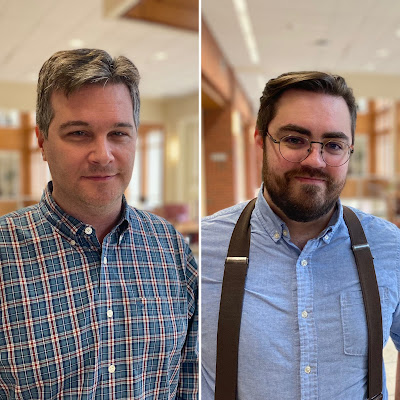OU Engineering 'technical liasion' enjoys BCS bid
Oklahomans nervously awaited the release of the BCS standings on Dec. 2. OU still had a shot at the BCS title game. Unfortunately for Oklahoma, the Sooners were shipped out to the Fiesta Bowl, while Louisiana State went on to defeat the Ohio State Buckeyes in the title game. What few knew was that an invitation to the BCS title game had arrived in Norman. It came without fanfare or revelry. It was accepted humbly and quietly. Kevin Blake and Tyler Lane, the tech team of OU’s instant replay program, received their profession’s top honor when the Big 12 conference sent them to work the BCS title game, according to conference officials. “They have demonstrated the utmost level of professionalism,” said Walt Anderson, coordinator of Football Officials for the Big 12 Conference. “When we were awarded the National Championship, we knew we had to have our best people when that much is on the line.” Prior to receiving the invitation for the big dance this year, Lane said the OU crew successfully served in the same capacity at the 2005 Chick-Fil-A Peach Bowl and the 2006 Nokia Sugar Bowl. The significance of performing for big-name sponsors and national audiences is not lost on the Big 12, which was selected as the neutral conference to provide officials for each of the games. “There is a lot at stake at the BCS football level,” Anderson said. “At schools in BCS conferences, football is a big business with a lot on the line. There’s a lot of responsibility to make sure the people and products are the best we can get.” Working the title game went without incident, according to Blake and Lane, who traveled to New Orleans three days before the game to begin setting up. The duo said the important parts of their jobs are planning for contingencies, testing and retesting, well before kickoff. “Knock on wood,” Lane said. “We’ve never had a failure or issue where we’ve had to go to our backup plan.” According to NCAA rules regarding the instant replay system, a minimum of three persons must be present to ensure all plays are quickly and accurately evaluated. OU typically uses a four-person crew, comprised of Lane, Blake and two replay officials. “What Tyler did was take a program that was completely new and implement it at a faster pace than what others could,” Anderson said. Lane, the Information Technology representative for the College of Engineering, said he was the IT representative for the department of athletics three years ago when the instant replay system was introduced to the NCAA. “It was one of my projects to make sure the booth was ready for the system,” Lane said. “It seemed liked a fun place to work on game day.” While technology often combines with and drives the evolution of athletics, the on-campus collaboration is unique because it remains a joint venture, Blake said. “The instant replay project … is a testament to the importance of partnerships,” Dennis Aebersold, IT chief information officer and vice president, said in an e-mail. “Partnerships offer opportunities for the staff to meet unique needs by developing innovative solutions, and then tackling those exciting new projects together.” While a graduate student initially assisted Lane in the endeavor, Lane said he sought out Blake for his expertise in the communications field. Blake, an IT media specialist, brought a television broadcast, programming and computer science background with him to the replay booth. Anderson said the consistency and routine the duo demonstrated in their first year together helped them become one of the most successful technician crews in the conference and nation. “We’re technical liaisons,” Blake said. “We facilitate the officials to make sure their jobs get carried out in the most efficient way possible.” Efficiency, a word constantly repeated by and about Blake and Lane, is indivisible from their roles. Per NCAA regulations, the replay booth reviews every single play run on the field, amounting to an average of 150 in a three and a half hour span. Blake said their success has come through a tedious dedication to detail. “It is 60 minutes of real pressure,” Anderson said. “They have to make a decision about every single [play]. We, on average, stopped two plays a game. [The audience does not] see the countless others that the guys are seeing and having to make decisions about.” But the intensity of game day operations, even at the nation’s most prestigious matchup, doesn’t fluster the pair, Blake said. “It’s a job,” he said. “We’re capable and very professional in carrying out our responsibilities. Once it started, it was like every other game.” “Now, if the refs felt additional pressure, who knows,” Lane said with a laugh.


